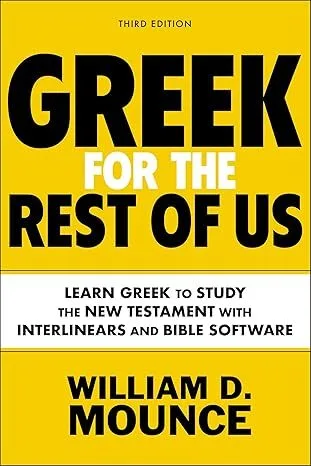Pronunciation Guide: HO-pose
Quick Answer: ὅπως (hopōs) means “in order that” or “so that,” expressing divine purpose and intentional outcomes in God’s redemptive plan, revealing how the Almighty orchestrates circumstances for His glory and our good.

Key Information
ὅπως

Strong’s Entry
g3704
hopos (hop’-oce) adv.1. what(-ever) how, i.e. in the manner that (as adverb or conjunction of coincidence, intentional or actual)[from G3739 and G4459]KJV: because, how, (so) that, to, when Root(s): G3739, G4459
1. What Does ὅπως Mean?
Strong’s G3704: ὅπως is a conjunction that expresses purpose, intention, or desired outcome, typically translated as “in order that,” “so that,” or “how.” This powerful word reveals the intentional nature of God’s actions and the purposeful design behind His commands and promises. When we encounter ὅπως in Scripture, we’re glimpsing the divine architect at work, showing us that nothing in God’s economy happens by accident. The word carries the weight of divine intention, revealing that behind every command, promise, and prophetic declaration lies the purposeful heart of our Creator who works all things according to the counsel of His will.
Key Insight: ὅπως unveils God’s intentional design, showing us that divine actions always have purposeful outcomes aligned with His perfect will and glory.
2. Where Does ὅπως Come From?
- Part of Speech: Conjunction (particle)
- Root Components: Combines ὅς (hos, “who/which”) + πως (pōs, “somehow/in some way”)
- Language Origin: Classical Greek
- Primary Usage: Found in narrative, teaching, and prophetic contexts to express divine purpose
- Function: Introduces purpose clauses and final clauses
3. What Is the History of ὅπως?
The conjunction ὅπως has a rich historical development from classical Greek literature through biblical usage. In classical Greek authors like Xenophon and Plato, ὅπως primarily functioned to introduce purpose clauses and indirect questions, expressing intention and desired outcomes. The word carries the fundamental meaning of purposeful direction, indicating not merely that something happens, but that it happens with specific intent and design.
In the Septuagint translation of the Hebrew Scriptures, ὅπως frequently translates Hebrew constructions that express divine purpose, particularly the Hebrew לְמַעַן (lema’an, “in order that”) and similar purposeful expressions. This usage established a theological foundation where ὅπως became associated with divine intentionality and the purposeful unfolding of God’s redemptive plan. The Septuagint translators recognized that this Greek conjunction perfectly captured the Hebrew concept of divine purpose working through historical events.
Early church fathers like John Chrysostom and Origen frequently commented on passages containing ὅπως, recognizing its significance in revealing God’s purposeful nature. They understood that when Scripture uses this conjunction, it’s drawing attention to the divine architect behind circumstances, showing that what appears to be coincidence is actually divine providence working toward predetermined outcomes.
Historical Summary: ὅπως evolved from classical purpose expressions to become Scripture’s key word revealing divine intentionality and God’s purposeful orchestration of redemptive history.
4. How Should ὅπως Be Translated?
Primary Meanings:
- Purpose/Intention: “in order that,” “so that”
- Result/Outcome: “that,” “with the result that”
- Method/Manner: “how,” “in what way”
- Indirect Question: “how,” “in what manner”
Translation Tip: Context determines whether ὅπως expresses intended purpose (God’s design) or actual result (what actually happened), though both often align in divine providence.
ὅπως Translation Options:
- “In order that” – Emphasizes divine intention and purposeful design behind actions
- “So that” – Highlights the intended result or outcome of God’s working
- “That” – Simple purpose expression showing divine goal or objective
- “How” – When introducing indirect questions about divine methods
- “Lest” – When combined with negative particles, expressing divine protection or prevention
5. How Is ὅπως Used in the Bible?
Throughout the New Testament, ὅπως appears in contexts that reveal God’s purposeful nature and intentional design. The word frequently introduces purpose clauses that explain why God acts, commands, or allows certain circumstances. In the Gospels, ὅπως often reveals the divine purpose behind the Messiah’s actions and teachings, showing that His ministry followed a predetermined plan for redemption. The epistles use ὅπως to explain the purposeful nature of Christian living and God’s ongoing work in believers’ lives.
The Septuagint usage of ὅπως provides crucial background for understanding its New Testament significance. In the Greek Old Testament, this conjunction frequently translates Hebrew expressions of divine purpose, particularly in prophetic literature where God declares His intentions for Israel and the nations. This established theological precedent helps us understand that when the New Testament writers use ὅπως, they’re connecting current events to the eternal purposes of God revealed throughout Scripture.
Usage Summary: ὅπως consistently reveals divine intentionality throughout Scripture, connecting God’s eternal purposes with temporal events in redemptive history and Christian experience.
Cross References:
- “And he sent them to Bethlehem and said, ‘Go and search carefully for the young Child, and when you have found Him, bring back word to me that [ὅπως] I may come and worship Him also.'” Matthew 2:8
- “Take heed that [ὅπως] you do not do your charitable deeds before men, to be seen by them.” Matthew 6:1
- “Therefore pray the Lord of the harvest that [ὅπως] He will send out laborers into His harvest.” Matthew 9:38
- “But that [ὅπως] it might be fulfilled which was spoken by the prophet.” Matthew 12:17
- “But all this was done that [ὅπως] the Scriptures of the prophets might be fulfilled.” Matthew 26:56
- “That [ὅπως] they should seek the Lord, in the hope that they might grope for Him and find Him.” Acts 17:27
- “That [ὅπως] your faith should not be in the wisdom of men but in the power of God.” 1 Corinthians 2:5
6. What Cultural Context Surrounds ὅπως?
In ancient Greek culture, the concept of purpose and intentional design was fundamental to philosophical and religious thinking. Greek philosophers extensively discussed the notion of τέλος (telos, ultimate purpose or end goal), and ὅπως served as a linguistic bridge connecting present actions with intended outcomes. This cultural background helps us understand why New Testament writers chose this particular conjunction to express divine purpose—it resonated with Greek-speaking audiences who were already familiar with purposeful thinking and intentional design.
The Hebrew mindset behind much of Scripture emphasizes God’s purposeful nature and intentional working throughout history. When Hebrew concepts of divine purpose were translated into Greek using ὅπως, it created a powerful theological fusion where Greek precision met Hebrew theological depth. The Hebrew concept of לְמַעַן (lema’an) expresses the idea that God acts with specific purposes in mind, always working toward predetermined outcomes that glorify His name and accomplish His redemptive purposes. This Hebrew understanding enriches our comprehension of ὅπως beyond mere grammatical function to theological significance.
Cultural Context: ὅπως bridges Greek philosophical concepts of purposeful design with Hebrew theological understanding of divine intentionality in redemptive history.
7. What Does ὅπως Teach Us About God?
The frequent use of ὅπως in Scripture reveals profound truths about God’s character and nature. This conjunction demonstrates that our God is not a deity of random actions or arbitrary decisions, but rather the divine architect who works all things according to the counsel of His will. Every use of ὅπως points to God’s purposeful nature, showing us that behind every divine command, promise, and action lies intentional design aimed at specific outcomes that glorify Him and benefit His people.
Furthermore, ὅπως reveals God’s sovereignty and omniscience working together in perfect harmony. The conjunction shows us that God not only knows the end from the beginning but actively orchestrates circumstances to achieve His predetermined purposes. This understanding should fill believers with confidence and peace, knowing that nothing in their lives happens by accident but rather unfolds according to divine purpose. When we encounter difficulties or blessings, ὅπως reminds us to look for God’s purposeful hand working even in circumstances we don’t yet understand.
Theological Core: ὅπως reveals God as the purposeful architect of redemption, working all circumstances according to His perfect will for His glory and our ultimate good.
8. How Can I Apply ὅπως to My Life?
Understanding ὅπως transforms how we view our daily circumstances and life challenges. When we grasp that God works with purposeful intention, we can approach difficult seasons with faith and expectation, knowing that He is orchestrating events for specific outcomes aligned with His perfect will. This perspective shifts us from asking “Why is this happening?” to “What purpose might God have in this situation?” Such a mindset cultivates patience, trust, and spiritual maturity as we learn to cooperate with God’s purposeful working rather than resist it.
Additionally, recognizing God’s purposeful nature through ὅπως should inspire us to live with intentionality and purpose ourselves. As image-bearers of the purposeful God, we’re called to live deliberately, making choices that align with His revealed purposes for our lives. This means approaching our relationships, work, ministry, and personal growth with the same intentional design that characterizes God’s working in our lives.
Self-Examination Questions: Am I looking for God’s purposeful working in my current circumstances? How can I align my daily choices with His revealed purposes? Do I trust His intentional design even when I can’t see the outcome?
9. What Words Are Similar to ὅπως?
- ἵνα (hina) – HEE-nah: The most common purpose conjunction meaning “in order that” or “so that,” often interchangeable with ὅπως but slightly more common in New Testament usage. See G2443
- διὰ τοῦτο (dia touto) – dee-ah TOO-toh: Meaning “for this reason” or “therefore,” expressing purpose through causation rather than direct intention. See G1223
- πρός (pros) – prohs: When used with infinitives, expresses purpose meaning “for the purpose of” or “in order to,” focusing on direction toward a goal. See G4314
- εἰς (eis) – ice: Often expresses purpose when used with infinitives or nouns, meaning “for” or “unto,” indicating direction toward an intended outcome. See G1519
- ὡς (hōs) – hohce: Can express manner or purpose meaning “as” or “how,” though more commonly indicates comparison or manner rather than direct purpose. See G5613
10. Did You Know?
- What does ὅπως mean in modern Greek? Modern Greek retains ὅπως with similar meaning, still expressing purpose and intention, though contemporary usage has expanded to include more casual expressions of manner and method in everyday conversation.
- How did Plato use ὅπως? Plato frequently employed ὅπως in his dialogues to introduce purpose clauses when discussing the ideal state and moral philosophy, demonstrating that purposeful thinking was central to ancient Greek intellectual culture.
- What’s the difference between ὅπως and ἵνα? While both express purpose, ὅπως often carries a more formal or literary tone and frequently appears in contexts emphasizing divine purpose, whereas ἵνα is more common and versatile in everyday New Testament usage.
- Why does the Bible use ὅπως primarily in fulfillment passages? ὅπως appears frequently in “fulfillment” passages because it perfectly expresses how God’s ancient promises achieve their intended purposes in the Messiah, showing divine intentionality across centuries.
- How does ὅπως relate to biblical prophecy? ὅπως reveals that biblical prophecy isn’t mere prediction but purposeful declaration of God’s intended outcomes, showing that He speaks future events into existence with specific redemptive goals in mind.
- What causes confusion about purpose today? Modern secular thinking often struggles with the concept of ultimate purpose, but ὅπως in Scripture reveals that life has divinely intended meaning and direction, countering nihilistic worldviews with purposeful hope.
11. Remember This
ὅπως stands as Scripture’s beacon illuminating God’s purposeful heart—every divine action carries intentional design, every circumstance serves redemptive purpose, and every believer participates in the grand narrative where the Almighty’s “in order that” transforms ordinary moments into eternal significance.
Note: While this entry strives for accuracy, readers engaged in critical research should verify citations and keyword occurrences in their Bible translation of choice. For Biblical citations, the F.O.G Bible project recommends Logos Bible software.
Strong's g3704
Add Comment
God's Word is too vast for a single perspective. We all have a story, and as believers we all carry the Holy Spirit who is the Revealer. With this in mind - I would love to read your comments.




